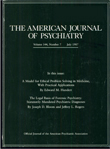Attentional Performance in Patients With Psychotic and Nonpsychotic Major Depression and Schizophrenia
Abstract
OBJECTIVE: The authors examined Continuous Performance Test scores of patients with major depression with or without psychosis and schizophrenia. METHOD: Patients with major depression with psychosis (N=13), major depression without psychosis (N=14), and schizophrenia (N=15) and normal volunteers (N=14) completed the degraded-stimulus version of the Continuous Performance Test. Patients were rated with the Hamilton Depression Rating Scale and measures of positive formal thought disorder. RESULTS: Continuous Performance Test scores of patients with major depression with psychosis and schizophrenia were significantly worse than those of patients with major depression without psychosis and of normal volunteers. Positive formal thought disorder was correlated with performance on this test in patients with schizophrenia. CONCLUSIONS: These findings suggest that attentional impairment on the Continuous Performance Test is associated with psychosis in general and may be specifically associated with positive formal thought disorder in patients with schizophrenia. (Am J Psychiatry 1998; 155:137–139)



